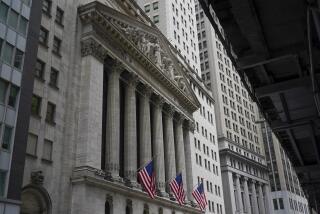New Deals May Signal Merger Resurgence
- Share via
Wednesday’s blockbuster deal between Comcast Corp. and AT&T; Corp. follows a recent spate of high-profile merger agreements, and offers Wall Street the most encouraging signs yet that a yearlong drought in merger activity is finally ending.
The number of mergers has fallen sharply this year after three record years because companies have been unwilling to make deals in a troubled economy. That has prompted Wall Street investment banks to resort to deep layoffs of their once-prized merger teams.
But the recent deals are raising hopes that corporate chieftains once again are willing to undertake the risks involved in big mergers.
“Clearly, corporate America believes it sees a turnaround in the economy,” said Tom Burnett, president of the Merger Insight newsletter in New York. “We’re beginning to see some serious money” going into mergers.
But several experts question whether the recent flurry is ushering in a rebound.
Although many companies would like to set deals, many are still afraid to do so when the prospects for an economic recovery are so uncertain, they say. The executives fear buying a company only to watch its sales slide in the recession.
“It’s not that they don’t want to do mergers,” said Judith Radler Cohen, editor of Mergers and Acquisitions Report. “It’s that they don’t have the confidence right now.”
Despite recent deals such as Amgen Inc.’s bid for Immunex Corp., overall merger volume is running well below year-ago levels. Through Tuesday, 8,040 mergers had been unveiled this year with a total announced value of $694 billion, according to Mergerstat, a Los Angeles-based research company. That’s off from 10,803 deals last year valued at almost $1.3 trillion.
The corporate-marriage rate soared throughout the 1990s, peaking from 1998 to 2000. In those years, the workweek began with what came to be known as “merger Monday,” a reference to the slew of deals announced after being agreed upon over the weekend.
Advising companies on mergers is one of the most lucrative businesses on Wall Street, and it generated huge profits throughout the 1990s. But after years of bulking up their staffs, investment banks suddenly are scaling back their highly paid merger teams. Unlike in past recessions, large numbers of top-ranking people are being shown the door.
U.S. investment banks have earned $888.5 million in merger fees this year, down 32% from the $1.3 billion they took in last year, according to Thomson Financial, the lowest since 1994.
Several buyout proposals this week renewed hopes for a merger revival.
Besides Comcast’s $72-billion offer for AT&T;’s cable unit, Amgen bid $16 billion for biotech rival Immunex. Also, Vivendi Universal unveiled plans to buy the entertainment division of USA Networks Inc. for more than $10 billion, and P&O; Princess Cruises indicated Wednesday that it would consider an overture from Carnival Corp. if its suitor raised its $6-billion hostile bid.
Some analysts say this week’s activity could mark a turning point for merger activity. They say the companies wouldn’t pursue deals if they didn’t think the economy was on the mend. Bulls such as Robert Bertagna at Lehman Bros. say mergers will return because companies still have great incentive to cut costs and to become more competitive.
The stock market’s recent rally also offers hope. Both buyers and sellers were reluctant to make deals when stock prices were dropping. Buyers hoped the share prices of target companies would fall further, thus lowering the amount they’d have to pay in a merger. Target companies feared selling out at bargain prices.
Now “as the valuations have stabilized, both the buyers and sellers will become more realistic,” said Bertagna, head of western-region mergers and acquisitions at Lehman Bros.
As the Amgen deal shows, the biotech industry is seeing a spate of deals despite the weak economy. Companies are pairing up to expand product lines and to bolster sales, marketing and administrative heft. Among recent deals: Millennium Pharmaceuticals Inc. is acquiring Cor Therapeutics Inc., and MedImmune Inc. is gobbling up Aviron.
A broad resurgence of the merger market still faces many hurdles. One of the biggest is financing. When share prices were soaring, acquirers could swap their own stock for shares of the companies they were buying. Now, buyout targets often demand at least partial payment in cash, forcing suitors to raise money in an inhospitable debt market.
Also, the pace of deals has been inconsistent. There were 102 mergers announced the first week of this month, but a only 41 came last week, according to Thomson Financial.
“You get optimistic when there are a bunch of announcements one week, and then you get very few” the next, said Rick Escherich, managing director for mergers and acquisitions at J.P. Morgan Chase & Co.
In some ways, the year may be remembered more for the high-profile deals that went bust.
The reasons vary and some troubled deals still may be consummated, but several of this year’s biggest deals either unraveled or are threatening to.
General Electric Co.’s bid for Honeywell International Inc. was quashed by European antitrust concerns. Dynegy Inc.’s play for Enron Corp. crumbled amid the target’s financial quagmire. And Hewlett-Packard Co.’s pitch to Compaq Computer Corp. remains a longshot because of heavy shareholder opposition.
“The story this year is all about the busted deals,” said Richard Peterson, market strategist at Thomson Financial.
*
Dow Jones was used in compiling this report.
More to Read
Inside the business of entertainment
The Wide Shot brings you news, analysis and insights on everything from streaming wars to production — and what it all means for the future.
You may occasionally receive promotional content from the Los Angeles Times.










